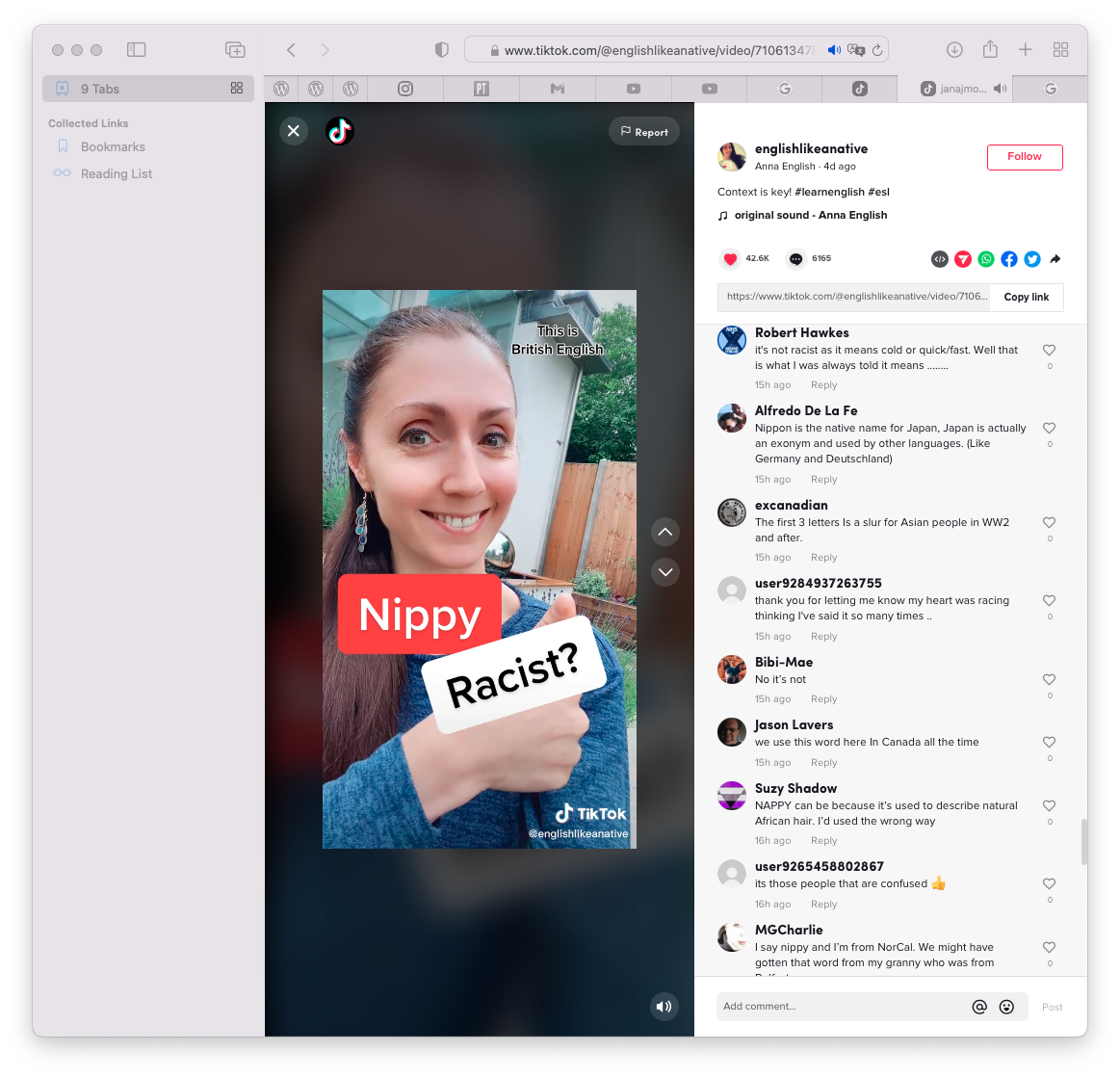I have a few distinct memories about my elementary school days in San Diego County. One is a White boy telling another White boy about a comment he made when my father, by that time partially crippled with Multiple Sclerosis, had come to see my teacher for a parent-teacher conference. The boy had made a weather-related pun, “There’s a little Nip in the air.”
That was decades ago, but when TikTok’s mysterious algorithm brought a native British English teacher’s video to my attention, I had to comment. I am, for the record, a native speaker of American English (specifically Southern California San Diego dialect) who lived for over a year in the England as a graduate fellow and I speak some Japanese.
Let me say that I don’t know this person, but I do know how to do a “little research” on the internet and obviously, she does not. That should be a big red flag or perhaps a White flag of ignorance.
While going through the many comments and commenting, I learned a lot (racist usage was apparent in the UK and Australia). I also noticed that there were people using politically incorrect terms unknowingly. Despite the increase in anti-Asian hate crimes in the US and elsewhere, recent articles in the mainstream press have mostly ignored such phrases.
-
12 racist and offensive phrases that people still use all the time (16 June 2020)
-
9 racist and offensive phrases that people still use all the time (7 January 2015)
The last article notes that “uppity” started within the Black community, but racists adopted it. While it mentions that “In the late 1800s and early 1900s, however, black people were hanged for acting ‘uppity’ or ‘insolent’–basically not knowing their place,” the late 1800s was a time when anti-Chinese sentiment led to massacres as well and that included lynchings.
Although one of the above articles notes that it is considered a microaggression to compliment a person of Asian descent on their ability to speak English, some commonly used phrases that are considered racist toward Asian Americans and people of Asian descent were not discussed. The below article is a little better.
And let’s not say that questionable behavior is limited to White people. The 1974 song “Kung Fu Fighting” was by Jamaican vocalist (Carl Douglas) and produced by British Asian Indian musician Biddu. Blaxploitation films could also show cultural appropriation such as “Black Belt Jones” with Jim Kelly who has played Mister Wiliams in Bruce Lee’s “Enter the Dragon.” In the 1973 “Cleopatra Jones,” the protagonist was skilled in karate. There are no actors of East Asian descent as main cast members in either film. This is the time period that had a White actor, David Carradine, playing a Chinese and White hapa in the TV series, “Kung Fu,” 1972-1975.
The British band, The Vapors, had the 1980 New Wave hit “Turning Japanese” which relates teenage angst and alienation to like being part of a foreign culture.
 Wesley Snipes was a Black vampire who had East Asian martial arts skills in the 1998 “Blade.” More recently, in the Netflix “Enola Holmes,” a Black British Nigerian actress (Susan Wokoma) was chosen to play Edith, the teacher of a women’s jiujitsu class (as opposed to a man or woman of East Asian descent). Would it be too odd to expect a Japanese woman or man to teach a class in Japanese self-defense? Japan was, in 1900, a close ally of the British and would side with the UK in the Boxer Rebellion (1899-1901) (as part of the Eight-Nation Alliance) and World War I.
Wesley Snipes was a Black vampire who had East Asian martial arts skills in the 1998 “Blade.” More recently, in the Netflix “Enola Holmes,” a Black British Nigerian actress (Susan Wokoma) was chosen to play Edith, the teacher of a women’s jiujitsu class (as opposed to a man or woman of East Asian descent). Would it be too odd to expect a Japanese woman or man to teach a class in Japanese self-defense? Japan was, in 1900, a close ally of the British and would side with the UK in the Boxer Rebellion (1899-1901) (as part of the Eight-Nation Alliance) and World War I.
World War II
Then there was World War II where Japan was allied with Italy and Germany (who were part of the Eight-Nation Alliance) against the UK, France and the US amongst others.
World War II is an important part of this long explanation, but yellow perilism is as well. The UK, the US, Canada and Australia all had legal racism against East Asian nations.
- Unequal Treaty in Chinese History
- Unequal Treaties with China
- How to manage Sovereignty Restriction: Japan’s experience of the 19th century “Unequal Treaty” and postwar Japan-US Security Treaty
On a national level of political policy, there were these acts of legislation:
- White Australia policy
- Anti-Chinese Legislation in Australasia
- Anti-Asian Racism in Canada
- The Qualification and Registration of Voters Act of 1872
- Electoral Franchise Act, 1885
- Chinese Immigration Act of 1923
- The US Chinese Exclusion Acts
- US Immigration Act of 1924
- US State Alien Land Laws
- British Expulsion of Chinese
It’s an important point that even when an East Asian nation like Japan or China was a US or UK ally, there was still institutionalized, legal forms of racism in place. World War II broke down some of the racist legal barriers, but also increased some of the anti-Asian rhetoric.
World War II began in 1939 in Europe. The United States did not official join the war until the bombing of Pearl Harbor (7 December 1941).
Weather-related Racist Puns
In Japan, the word for Japan (日本) is pronounced either “Ni-hon” or “Nippon.” From this, comes the word, “Nipponese,” and the abbreviated term, “Nip.”


From Nipponese, comes the shorter “Nips.”
In 2018, NIPS was considered offensive (sexist and racist) for the acronym for Neural Information Processing Systems to be changed.
- AI conference widely known as ‘NIPS’ changes its controversial acronym (19 November 2018)
-
AI Researchers Fight Over Four Letters: NIPS (26 October 2018)
- Letter from John Hopkins University Academics on NIPS
According to the UK dictionary, “Nip” is also offensive and “a contemptuous term for a Japanese person.”
The Cambridge Dictionary of British English also defines “Nip” as an “old-fashioned offensive” term for a Japanese person.
Usage in the UK, the US, Canada and Australia has taken the word “Nip” and transformed it into “Nippy” and “Nipper.” The weather-related puns are:
- There’s a little Nip in the air.
- There’s a nasty Nip in the air.
- It’s a bit/little Nippy.
The word “nip” or “nippy” can be replaced with “Pearl Harbor” or the Canadian, British or Australian “Pearl Harbour.” While I usually love puns, I don’t love this one.









So you can’t say: “It’s a bit nip.” You’d have to say: “It’s a bit nippy.” So in other words, the noun phrase “Pearl Harbour” or “Pearl Harbor” replaces the word “nippy.”
People commenting on English Like a Native’s video note this weather-related pun that uses a racist slur. This slur is part of English in US, UK, Canada and Australia.
A similar discussion took place on Reddit:

Other incidents of linguistic faux pas:


Radio 1 said it had received no complaints, but someone did complain about a BBC description of the weather in 2018. Again, in the sentence “It’s a bit Pearl Harbour,” the word replaced is “nippy.”




We’ve covered the racist usage of Nip, Nippy, but not Nipper. Here it is from Canada.
The word “gook” is, according to Merriam-Webster, “used as an insulting and contemptuous term for a nonwhite, non-American person and especially for an Asian person.”
Jap
In the commentary on Anna English’s video, a few people used the word “Jap.”
This is considered “offensive” in both British and American English. It is not analogous with “Brit” for “British.” People who know about the sociopolitical remnants of the American Civil War might understand why “Yank” is not always the best slang for US citizens and residents.
Merriam-Webster defines “Jap” as a disparaging and offensive term for Japanese.

Oriental
In general, it is safe to use “Oriental” to refer to rugs and poppies.
Merriam-Webster notes, that the adjective “Oriental” “carries strong associations with colonialism.
American Heritage notes it is “often offensive” when referring to an Asian, especially a South Asian, Southeast Asian, or East Asian.
Many university departments that were formerly called “Oriental Languages” (e.g. UCLA’s Department of Oriental Languages) have changed their names. The International Congress of Asian and North African Studies (ICANAS or Congrès international des études asiatiques et nord-africaines) was founded in 1873 as the International Congress of Orientalists (Congrès international des orientalistes), but changed its name in 1976 to International Congress of Human Sciences in Asia and North Africa (Congrès international des sciences humaines en Asie et en Afrique du Nord) and in 1986, adopted its current name. The original meaning of the Orient included all countries and cultures from North Africa to the Pacific Islands and one of the reasons it is considered racist is because of the sweeping generalizations made about all of those cultures, races and ethnicities.
If it is important to raise an awareness of racism and microaggressions against Black people, then it should also be important to go beyond the binary of Black and White when looking at race and racism. There have been historic macroaggressions and microaggressions against people of East Asian descent in the UK, the US, Canada and Australia. And in Canada, the UK and the US, there are currently heightened racism against people who are thought to be Chinese–so East Asians, Southeast Asians and Pacific Islanders.
- Racism Against Chinese Australians Is Being Made Worse by Anti-China Election Rhetoric (20 May 2022)
- It’s time we stopped downplaying the UK’s anti-Asian racism (18 March 2021)
- 2 Years into the Pandemic, Anti-Asian hate Is Still on the Rise in Canada, Report Shows (3 April 2022)
- This Is the Anti-Asian Hate Crime Capital of North America (7 May 2021)
If one wants to help people learn a foreign language, then one should be concerned about possible faux pas and racist/sexist innuendos that words may have. You want people to avoid awkward situations and misunderstandings, right? That’s what communication is about. Further, if one is to research once a question is posed, one needs to do a better job than this person did. None of these searches that I did required that I be bilingual or polylingual. It was helpful that I knew how to say Japan in Japanese, but the other searches were done completely in English.










[…] Nippy, Nipper and Nip and Weathering a Racist Pun […]
LikeLike